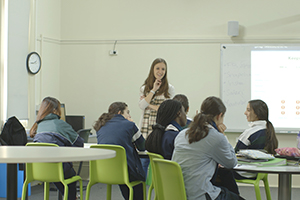What we teach
We offer research-driven, interdisciplinary teaching at undergraduate, graduate and PhD level
Overview
Our core aim in our teaching is to equip students with critical-thinking and problem-solving skills. Our teaching is heavily research-driven, inter-disciplinary and technology-based. Many of our subjects involve experiential learning.
Undergraduate subjects

In our subject Algorithmic Trading, a third-year subject, students learn to develop trading algorithms for securities markets. The subject combines game theory, market microstructure theory, algorithm design and coding, statistical analysis and backward testing to provide the foundations for the design and testing of trading algorithms. It is a hand-on subject in which two-thirds of the time is spent on applications. The subject is heavily technology-based using both a custom-built programming platform (based on Python) and a propertietary high-frequency trading platform. The subject won the 2020 Financial Management Association Innovation in Teaching Award.

In the subject Foundations of Fintech, a third-year subject, students are introduced to a set of new and emerging technologies, which they subsequently use to develop novel solutions for core problems in finance such as payments and valuation of securities. Students learn relevant theoretical concepts from economics and finance, key insigts from behavioural sciences as well as key skills in algorithm design and coding. We cover technologies like blockchain, asset tokenisation, smart contracts as well as various machine learning models. Students then use these new technologies to solve a number of important finance use cases. For example, they learn how to the blockchain to build digital currencies and how to use smart contracts to overcome contracting problems. They also learn how to use machine learning tools to value securities and allocate funds to asset classes. The subject uses a custom-built programming platform (based on Python). The subject was a finalist in the 2021 Australian Financial Review Higher Education Awards.

Street Finance is a third-year subject that involves students visiting secondary schools in the greater Melbourne area for the purpose of delivering three lessons on finance topics of interest and relevance to young people. The subject provides a unique opportunity for students to develop their technical and communication skills, while at the same time making a tangible contribution to the community through the delivery of finance lessons to an audience that may not have access to financial education or the finance profession. Street Finance was a finalist in the 2021 Australian Financial Review Higher Education Awards. More information about Street Finance is available on the Street Finance program page.

Elements of Quantum Computing is a second-year subject jointly offered by the School of Physics, the School of Computing and Information Systems, and the Centre for Brain, Mind and Markets. It provides an introduction to quantum computing for students from a range of backgrounds that will position students for further studies in quantum computing and programming. It covers basic principles of quantum bits (qubits) and quantum logic operations, through to applications in communication, security, optimisation, finance and machine learning. In computer-based tutorials, students learn quantum computer programming using a state-of-the-art simulation environment, and access online quantum computer systems.
Graduate subjects
Almost all financial phenomena are a consequence of human decision-making. Elucidating the psychological nature of decision-making is therefore critical for understanding many issues in finance. In our subject Behavioural Finance, we introduce methods for examining psychological mechanisms underlying human decision-making, and discuss how these mechanisms can explain anomalies in financial behaviour that cannot readily be explained by existing methods in the finance discipline. The subject provides students with knowledge of major trends in this interdisciplinary research field that combines elements of both finance, economics, psychology and neuroscience.
Technology has been transforming the financial industry, with the potential to deliver existing financial products and services more effectively and to develop new ones. The subject Fintech: Foundations and Applications introduces fundamental economic concepts such as money, moral hazard, property rights and bank runs, and psychological concepts (including engagement, trust and privacy) relevant to major problems faced by the financial sector. It also discusses new technologies (such as big data, distributed ledgers, artificial intelligence, machine learning and natural language processing) underlying real-world fintech applications. The focus is on core concepts and foundations, with the aim to develop students' ability to actively participate in creating fintech solutions.
The subject Experimental Methods for Decision Studies involves in-depth analysis of experimental design and management, and subsequent data processing for laboratory and field experiments on human decision-making, with a focus on choice under uncertainty, inter-temporal choice, and complex choice situations. Experiments include single-subject, small-group, and large-group contexts including financial markets. Emphasis is placed on incentivised, deception-free experimentation..
Doctoral training
We offer an interdisciplinary doctoral program on decision-making. The program involves two years of coursework in the disciplines of computer science, economics, mathematics, neuroscience and psychology, followed by three to four years of doctoral research. Please visit the site of our program (Decision, Risk and Financial Sciences) for more information.
We also offer a joint PhD program with the University of Bonn in Germany in the area of decision neuroscience and computational psychiatry. More information is available on the program page.